2019-2025
The Bidibidi Refugee Settlement is a refugee camp in the Yumbe district of northwestern Uganda. With over 270,000 South Sudanese refugees fleeing the ongoing civil war, it is one of the largest refugee settlements in the world.
According to the United Nations refugee agency (UNHCR), Uganda hosts the largest number of unaccompanied child refugees in the world – some 41,200 in 2018 – with the majority less than 15 years old and nearly 3,000 younger than five.1
The Bidibidi area covers 250 square kilometers of the eastern half of Yumbe District, stretching southward from the South Sudanese border and spilling over into Moyo District along the western bank of the Kochi River.
With the funding from the the UK Aid ACTIVE grant, VSO has been supporting Early Childhood Care and Education (ECCE) centres in zone three of Bidibidi Refugee Settlement since 2019. The project aims to improve access to inclusive and quality early learning, for children under 6 years-old in the settlement. This is a key period of brain development for children and ECCE is essential to ensure that children can prosper in the future.
So far we’re supported
4,500 learners to enrol in school, with 79% of schools reporting increased attendance due to the project.
7,370 community members, who have been engaged in activities supporting parents to enrol their child in school and support the school and their education.
50 early grade teachers and 48 caregivers have been trained in gender equal and disability sensitive teaching methods.

The issue
The population of Bidibidi Refugee Settlement is uniquely diverse, with different tribes from South Sudan spread across its five zones with different ethnic backgrounds, namely the Bari, the Nuer and Kuku. The proximity of the tribes causes increased tensions and sometimes conflicts and fights arise. The settlement can be an unsafe place for children.
A study funded by the ACTIVE grant revealed that the eight early childhood care and education centres, had no single early childhood development centre meaning children under age six had no formal education and were being sent straight to primary without being prepared.
Without attending ECCE centres the children are prone to harm, both at home and within the community. They need protection and psychological support to mitigate the effects of this.
A study from UNESCO found environmental risks, road accidents, severe corporal punishment, neglect, sexual violence, witnessing domestic violence, child labour and harmful traditional practices, are the common risks children face in Bidibidi refugee settlement. Rarely do these incidents happen in schools or on the way to school.2
Lack of permanent structures and inadequate and poor sanitation facilities for the children undermines their learning, and many of the temporary structures are unsafe, especially during poor weather conditions.
This especially impacts the enrolment of children with disabilities as a lack of facilities, like ramps, mean that those with disabilities are less likely to enrol in ECCE centres.
How we're supporting early childhood education
Support for caregivers
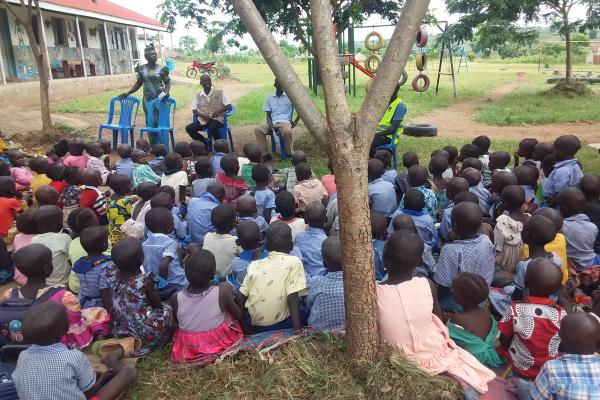
Training and mentoring are given to caregivers on ECCE learning frameworks, professionalism and classroom management skills and the production of teaching and learning materials for literacy and numeracy how to utilise education technology (EdTech) tools.
They are also trained in key family care practices, such as how to support parents on positive parenting, child involvement, gender transformative and disability sensitive methodologies and psychosocial support, wellbeing, and protection.
Support for schools and teachers
The project supports schools to organize open days through child-to-child activities to enhance participation, especially among girls and children with disabilities. Learning through play stations have also been set up at the learning centres as play-based learning approaches can transform the educational experiences of children in the early primary grades, and strengthen learning.
VSO volunteers are coaching and mentoring early grade teachers, head teachers and deputy head teachers on the thematic /abridged curriculum including language orthography, lesson preparation and continuous assessment. Teachers are also taught to utilise EdTech and locally available materials in producing learning materials. Systems are also put in place to ensure a smooth transition from early childhood to primary and from one grade to another for lower classes.
Teachers are also mentored on gender transformative and disability sensitive teaching methodologies as well as how to combat violence against children in Schools (VACiS) and support children through psychosocial support and wellbeing.
Engaging with the parents and the community
Through school events and recruitment of Male Champions, the project is working to increase the community's knowledge on the importance of ECCE, to encourage parents to enrol their children.
Parents are also engaged as volunteers to support in centre activities and participation in developing play materials which has helped minimize negative attitudes towards early childhood care and education.
Volunteers also engage with the local community to change attitudes around girls' education and education for those with disabilities.
How children aged three to ten are benefitting
Higher enrolment

There has been a significant increase in the enrolment of children in ECCE centres, with 79% of project schools reporting increased attendance. As a result of the mass community enrolment drives, the project enrolled a total of 4,500 children in the programme and observed a change among the parents and community towards ECCE. The community also allocated land to the programme to facilitate the establishment of more learning centres.
Reasons participants reported for the increased enrolment were:
- The community feeding program
- Use of play materials and a good learning environment
- Early childhood education centres being nearby and easily accessible
- Regular engagement between parents and schools
- Improved school structures
- Provision of textbooks and learning materials
- Engagement with the community caregivers
Community appreciation of the value of ECCE
Community appreciation has been noted from the increased engagement of parents and the community in ECCE through their involvement in the construction of structures for the center, food contributions as well as engagement in making local materials for their children for school to enable their children to stay in school. In addition, the increased enrolment has been observed due to a change in perception towards children’s education at a young age by the parents.
Better learning outcomes
Children who attended ECCE classes for numeracy and literacy showed better outcomes in their performance and character compared to non-attending children. The participants of our research attributed this to improved knowledge and innovation by caregivers in child-based methodologies of teaching including, care and use of learning materials. These include using play-based learning models and utilising the VSOSCHOOL app to assist with learning.
Furthermore, the teaching approaches used in supported schools are also reported to contribute to both improved attendance and performance. Learning is said to be more fun, practical, with one caregiver saying:
My model of teaching was as if I was preaching to the children, but VSO taught us how to use child centred methods and learn through play’’
Challenging gender norms and parental roles
Behavioural change has also been attributed to improved male engagement and support of the learners, which is due to the Male Champions sensitization drive and championing the case of children. One of the parents reported;
“We fathers usually have the mentality of thinking that it’s the women that are supposed to prepare our children to go to school. The project introduced ‘male champions’, who taught fathers on how to handle their children, how to dress them and even escort them to school, not leaving this responsibility to just the mothers.” Male caregiver.
Discussions with participants indicated that men were more actively involved in the children’s education than in the past, with fathers accompanying their children to school, registering them with schools, and providing school resources like uniforms, books, and pencils.
I share roles with my husband, he can dress the children while I prepare something to eat. Then he will accompany them to school.’’Mother living in the Bidibidi Refugee Settlement
219 women have also been supported and empowered to take control of income in homes through inclusive finance literacy training, and participation in village savings and loans associations.
Parents are supported through livelihood initiatives so that they can improve their livelihoods to better support their child’s education. The project is also working with local governments to influence policies around girls’ education, disability, sexual and reproductive health rights (SRHR), agroecology and climate change.
Access for disabled children
There has been an increase in the enrolment of children with disabilities at learning centres. By training caregivers in skills such as sign language, they are better able to communicate and teach children with certain disabilities, for example blind and Deaf children.
More learning resources have also been developed that enable children with disabilities to take part in classes, as well as in recreational activities with other children. The identification of children with disabilities and successful referrals has supported children to be enrolled in schools and ECCE centres.
Building trusting teacher-pupil relationships
Children who have attended ECCE have been found to have a better relationship with their teachers, compared to those that have not received ECCE. Children who were able to go through ECCE consider their teachers as parents, compared to those that did not. They feel they can play with them and be close because they have grown up in a culture where they can easily approach their teachers for any assistance they need.
Reduced instances of child abuse
Discussions with the children and the caregivers reported that there is reduced instances of child abuse within the ECCE centres as well as the community. This is due to the community sensitization and trainings on child protection by the caregivers and the male champions. Besides, Centre Management committees’ ability to monitor the caregivers and involvement of the parents in the education of their children has promoted better parenting and have created a safe environment within the community and safe space for the children at the different centres.
Further, discussions with the Male Champions revealed a change in gender-based violence (GBV) prevalence within the community, through them championing and sensitising the community members about peaceful existence amongst families.
Community -led feeding program
The community-led feeding program allows parents, guardians and members of the community to contribute to school meals – often maize seeds, firewood or cash as agreed by the parents – to pay school cooks and fund soap and meals. Parents identified this as one of the key reasons for keeping their child enrolled in school as parents no longer had to worry about their child going hungry.
Volunteer participation
Volunteers from the community have been positioned as local caregivers, working with parents and service providers to ensure children attend and stay in schools. Caregivers sensitize parents and their children on the importance of early education. Volunteers follow up at home when children are absent and will escort them home if they are unwell. Parents reported that the caregivers at the ECCE centres were very understanding, caring and trustworthy, often helping the parents to understand the importance of educating children.
Volunteering for development
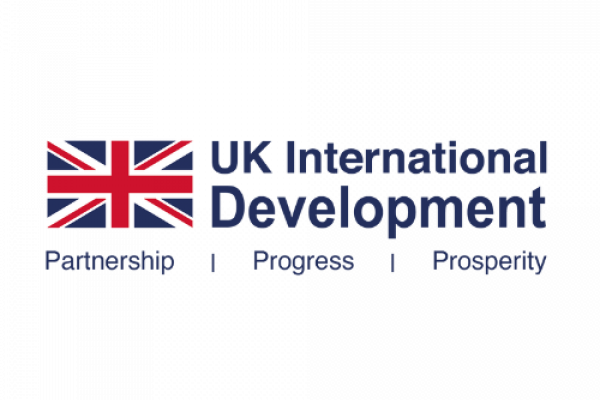
Through VSO’s volunteering for development method, community, national and international volunteers, come together to create sustainable and locally led solutions to address the problems facing their communities.
Our community youth volunteers advocate for inclusive education within the community, mobilizing parents to support their child's education, especially parents of children with disabilities. They work alongside our national volunteers who take on many different roles: supporting teachers as disability and inclusion advisors, early childhood education specialists, family planning advisors and assisting parents of children with disabilities to support them.
At the ECCE centres, volunteers also support child wellbeing and safeguarding as well as offering dietary advice for parents and support in accessing food.
Our Male Champions are pillars in the community, encouraging men to be involved in and advocate for their child’s education. They engage with fellow fathers in their community, to challenge attitudes around gender-based violence.
Our work
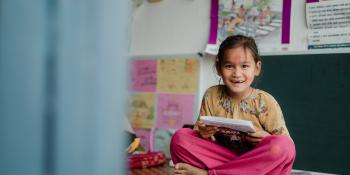
Inclusive education
Making sure everyone gets the skills they need to live a fulfilled, dignified life.
We helped almost 3.6 million people to access the quality education they deserve using our current strategy.
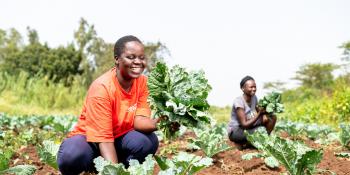
Resilient livelihoods
Ensuring people have the skills needed to support themselves and their families.
Over 400,000 people benefited from our work supporting livelihoods using our current strategy.
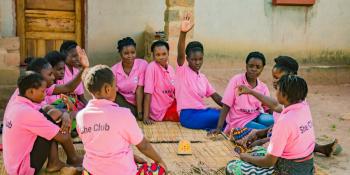
Adolescent and youth health and wellbeing
Improving health services and empowering people to exercise their right to quality care.
We helped almost 200,000 people access better healthcare using our current strategy.
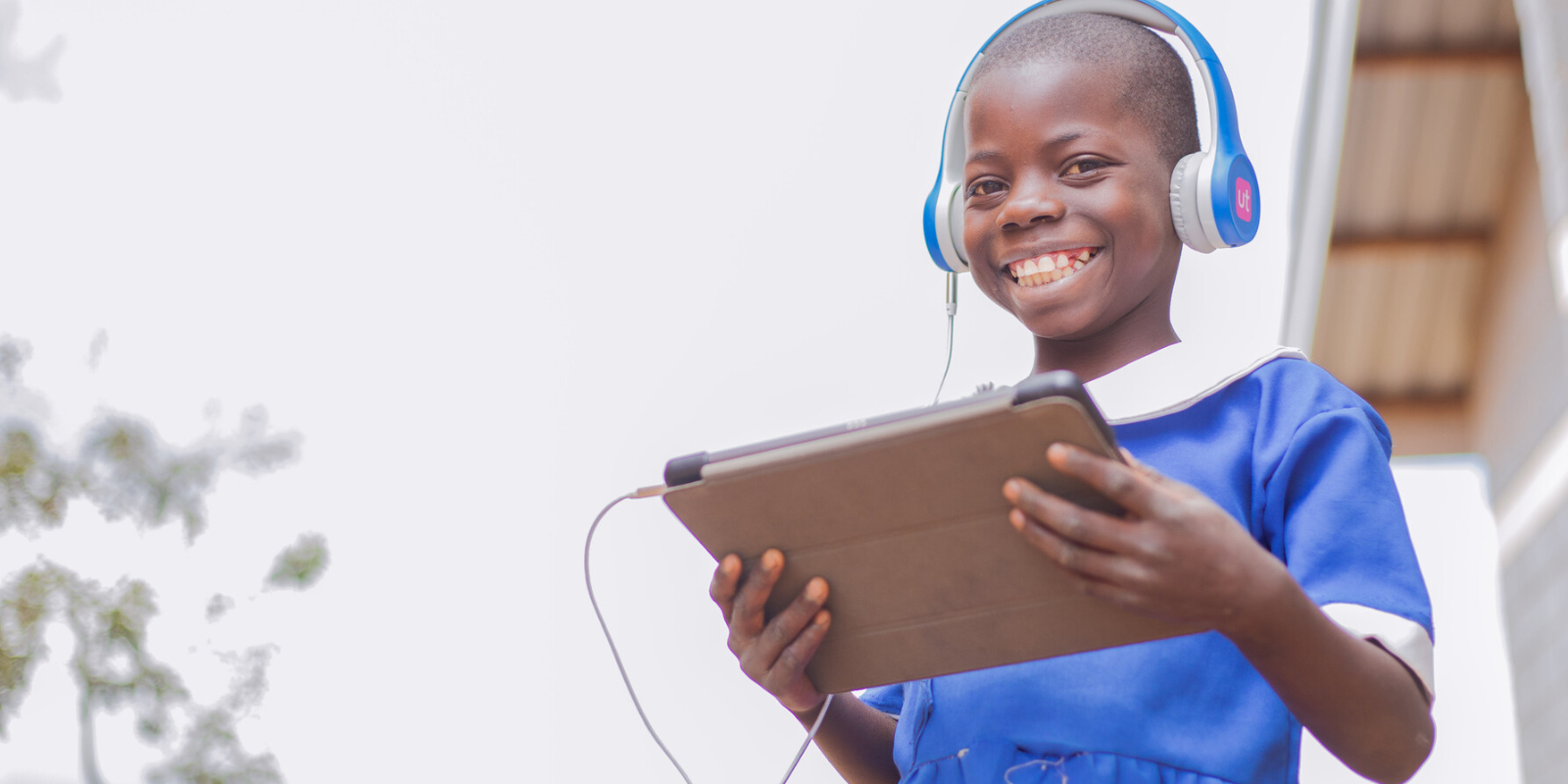
Support us with a donation
